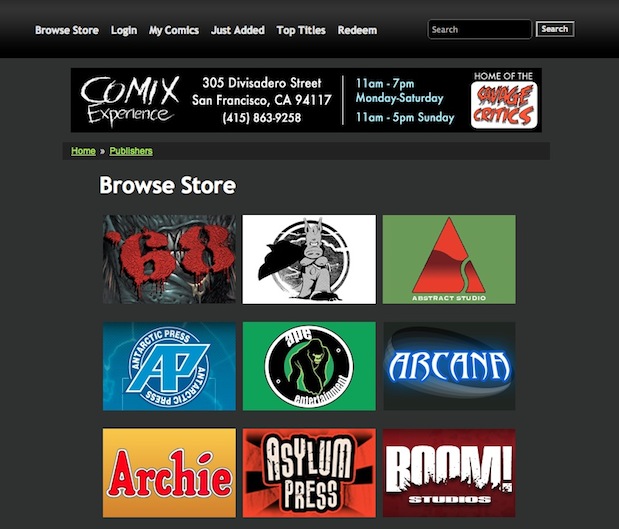Comics retailer Brian Hibbs, owner of Comix Experience in San Francisco, was one of the first retailers to adopt Diamond Digital’s digital storefront, and he reports that after three quarters, his total take is $22. What’s wrong with this picture? Hibbs is well known in the comics community, and he was linking straight to his digital comics store from reviews on the Savage Critics site, so that should have given him a natural advantage. On the other hand, as he himself notes, “The problem, of course, is that coverage here is very similar to what sells in the DM — it’s 70% or better for Marvel and DC, so there’s not as many direct links as I would have liked.” ComiXology has locked up DC and Marvel’s single-issue comics as digital exclusives, although the Diamond Digital store does carry Marvel graphic novels. A site that focuses on indy comics rather than superheroes would probably do better, as the Diamond storefront carries comics from BOOM! Studios, Image, IDW, and Top Shelf, and while Hibbs is not comfortable with comiXology’s terms of service for their retail sites, the fact is that he would probably make more money from them, at least in the short run.
A commenter points out several other problems, including the fact that at least some collected editions are more expensive on Diamond Digital than via comiXology or even in print. I would add that someone like Hibbs, who is passionate about comics, could add a lot of value to the site by really curating it, highlighting particular comics and making if-you-like-this-try-that recommendations, although I don’t know how much the software will allow. (For instance, take a look at the screenshot of the Comix Experience digital storefront, above—why are we seeing a list of publishers in alphabetical order on the landing page, rather than images of recommended comics, or at the very least, publishers ranked by popularity rather than the first letters of their names?)
ComiXology and Diamond Digital, have different terms for their retail sites and offer different advantages and disadvantages that might suit one type of retailer better than another. But the fact is that it really doesn’t matter, because many retailers aren’t using either one—and that is a lost opportunity, as Torsten Adair reports in The Beat.
Adair, who works in brick-and-mortar book retailing, picked six random zip codes and plugged them into Diamond’s Comic Shop Locator Service. He found 33 comics shops and found the following:
- Nine of the 33 stores had no website at all.
- Very few stores had a digital comics storefront; those that did, used comiXology.
- Three stores had excellent retail websites but only sold print comics, not digital.
Most comics shops are small businesses, and the person who runs them may not be particularly web-savvy. Still, there’s no excuse for not having a website in this day and age, and lack of digital comics storefronts would seem to be a missed opportunity as well. Brick-and-mortar retailers have expressed the fear that digital comics would cannibalize their sales, but so far that seems not to be the case; sales of both print and digital comics were up sharply in 2012. Adair points to some reasons why digital could be expanding the market, rather than cannibalizing print, and how retailers can capitalize on that. I think his key point is this:
Comics are now mainstream. There are many lapsed comics readers out there, and many recreational readers who occasionally read a comic or graphic novel.
How do you get to those readers? Many do not live near a comics shop (or they do but they don’t know it exists). And there is no centralized source of digital comics for those readers. (Serious comics fans use comiXology and perhaps iVerse as well, but we’re talking about the occasional reader here.)
What Adair envisions is retail stores getting together to form regional chains, with a high-visibility retail site and a regional warehouse that does fulfillment for both the stores and the print comics sales on the site. He also thinks there is potential for one-stop shopping: “Apple or Amazon could easily create a national comics shop selling paper and digital comics online.” I would add that comiXology could do this, if they had a high enough profile, and a large retailer could probably pull it off as well.
Adair’s proposal would allow individual comics shops to take advantage of some of the efficiencies of scale. On the other hand, shop owners may fear losing their store’s individual personality. Either way, not having a digital comics site—or having one but not putting any effort into it—seems like a missed opportunity to bring in some extra income. A really good digital-comics site would take advantage of the most important thing comics retailers can offer—their extensive knowledge of comics, their taste, and their intuition—to guide customers toward good comics and help them find comics they never knew existed. But that can only happen if the site exists in the first place.
